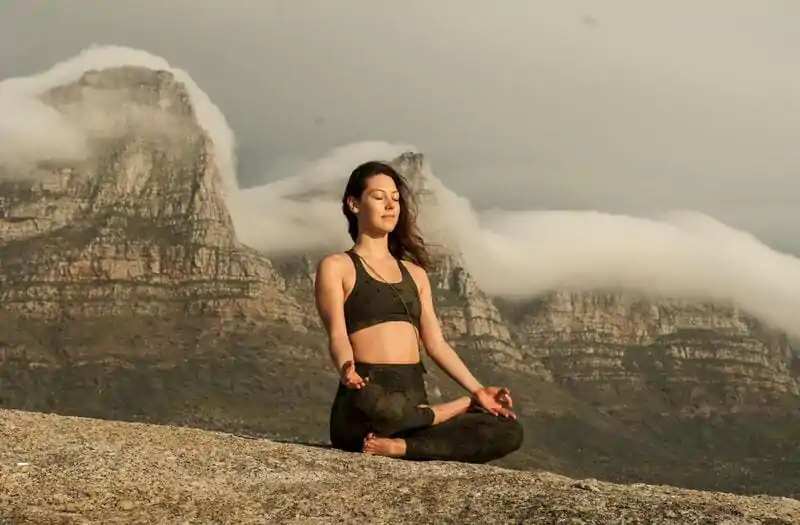Change, an inevitable part of life, often creates unease and anxiety. It challenges our comfort zones and confronts us with the unknown. But imagine navigating these shifts with a sense of calm and clarity. That’s where the power of mindfulness meditation comes into play, offering invaluable solutions for overcoming the fear of change. Naturally, that raises the question, “Can meditation cure anxiety?”. While meditation may not be a cure-all, it certainly offers powerful management tools. This article will show you how mindfulness meditation can transform your perspective and provide coping mechanisms for life’s constant evolutions.

Understanding the Roots of Our Fear
Overcoming the fear of change starts with understanding the roots of our fear. Our fear of change is deeply rooted in the human psyche. It’s tied to uncertainty and the unknown. Consider a person facing a career change: the loss of a familiar work environment, the challenge of new responsibilities, or the anxiety of meeting new colleagues. This fear can manifest through sleep disturbances, chronic anxiety, and physical symptoms like headaches or digestive issues. Specifically, it’s a natural response, hardwired into our survival instinct. However, it often holds us back from embracing growth and new opportunities.
Understanding Mindfulness Meditation
At its core, mindfulness meditation is about mastering the art of being present, free from judgment. Its roots trace back to ancient Buddhist practices. But nowadays, it’s recognized by scientists and psychologists for its mental health benefits. This practice involves directing our attention to the present moment – whether it’s our breath, bodily sensations, or the thoughts passing through our minds. The goal isn’t to empty the mind but to observe without attachment, thus reducing the power of fear and anxiety.
Techniques for Overcoming the Fear of Change
Mindfulness offers a suite of techniques for overcoming the fear of change:
#1: Breathing Exercises
Deep, mindful breathing is a straightforward yet potent mindfulness technique. It involves slowly and deeply inhaling through the nose, pausing briefly, and then exhaling slowly through the mouth. This focused breathing pattern, coupled with full attention on the breath, effectively calms a racing mind. Concentrating on each breath and the sensations it brings anchors you in the present moment, which helps reduce anxiety and stress. This intentional, slow-breathing practice is valuable for achieving mental clarity and tranquility. Here are a few breathing exercises you could try out.
#2: Acknowledging and Accepting Fear
Acknowledging fear rather than resisting it involves a conscious shift in how you respond to feelings of anxiety. It is critical in overcoming the fear of change. For example, if you’re apprehensive about a job change, you consciously recognize and label the emotion by thinking, “This is fear”. By doing this, you’re not trying to push the fear away or judge yourself for feeling it. Rather, you’re allowing yourself to feel the fear without letting it overwhelm you. This mindful acknowledgment acts as a mental note that helps diminish the fear’s power over you. It’s a way of gently observing and accepting your emotions as they are, which can surprisingly make them less intense and more manageable.
#3: Visualization Techniques
Visualization harnesses the power of your imagination to influence your mindset positively. It involves creating mental images of successfully managing and adapting to change. For instance, if you’re relocating to a new city, imagine yourself thriving in that new environment. That can include forming meaningful friendships, discovering exciting locations, and comfortably establishing a new daily routine. Visualizing positive outcomes enables you to rehearse and prepare for the change mentally. As a result, it shifts your perspective from one of anxiety to one of eager anticipation. By regularly practicing this technique, you can cultivate a more optimistic and confident outlook towards the changes in your life.
#4: Body Scan Meditation
The body scan meditation technique entails a focused, mental journey through your body to identify and acknowledge areas of tension or discomfort. During this process, you observe the various sensations in each part of your body, from head to toe. This heightened awareness helps you recognize how certain emotions, particularly those related to stress and anxiety from change, manifest physically in your body. You can gain insights into your emotional state by consciously noting these sensations without trying to change them. In addition, you’ll often experience a natural release of tension, leading to relaxation and reduced stress.
#5: Mindful Walking
Mindful walking is a meditative practice that merges the mental focus of meditation with the physical activity of walking. As you walk, the key is to pay close attention to the sensations and experiences of the moment. Specifically, you must feel your feet making contact with the ground, notice the steady rhythm of your steps, and tune into the various sounds around you. This form of meditation is especially beneficial for those struggling with sitting still, as it allows for movement while cultivating mindfulness. Plus, walking, combined with a heightened awareness of your bodily sensations and environment, can help center your mind, making it a practical and soothing mindfulness exercise.
Practical Tips for Daily Practice
Incorporating mindfulness meditation into daily life is simpler than it might seem:
Start with Short Sessions
Start your meditation practice with just five minutes a day. Then, gradually increase the duration as you become more comfortable.
Integrate Mindfulness into Routine Activities
Practice mindfulness during everyday tasks like washing dishes or showering. Focus fully on the task at hand, observing all sensations and thoughts without judgment.
Moreover, this is very useful in addiction recovery, which often involves significant lifestyle changes. Thus, to overcome this fear of change, you must maintain a routine during recovery. Daily meditation or mindful walking can help with that. They provide stability and help manage cravings. Plus, this routine gives you a sense of normalcy and control amidst the profound changes you’re experiencing.
Create a Mindful Space
Designate a quiet, comfortable spot in your home for meditation. This space should be free from distractions and conducive to relaxation.

Use Technology Wisely
Numerous apps offer guided meditations and mindfulness exercises, which can be especially helpful for beginners. However, you should do some research and read reviews before choosing one.
Be Patient and Consistent
Like any skill, mindfulness takes time to develop. Regular practice, even for a few minutes a day, can lead to significant improvements in managing anxiety and overcoming the fear of change.
Conclusion: A Journey Towards Embracing Change
Ultimately, overcoming the fear of change is gradual, and mindfulness meditation is a powerful ally on this journey. With dedication and practice, it can help you approach life’s changes with a sense of openness, curiosity, and resilience. Every moment, every breath, is an opportunity to practice mindfulness meditation and, in turn, ease your journey through the unpredictable waves of life.
Your Next Step
Now that you’ve gained insights into the transformative power of mindfulness meditation and discovered practical techniques for overcoming the fear of change, it’s time to take your journey a step further.
Learn how to embrace change with confidence and step into a future where mindfulness empowers you to navigate life’s twists and turns with ease, through the Samavira Meditation Trainings™. Sign up for our free live guided meditation sessions!







